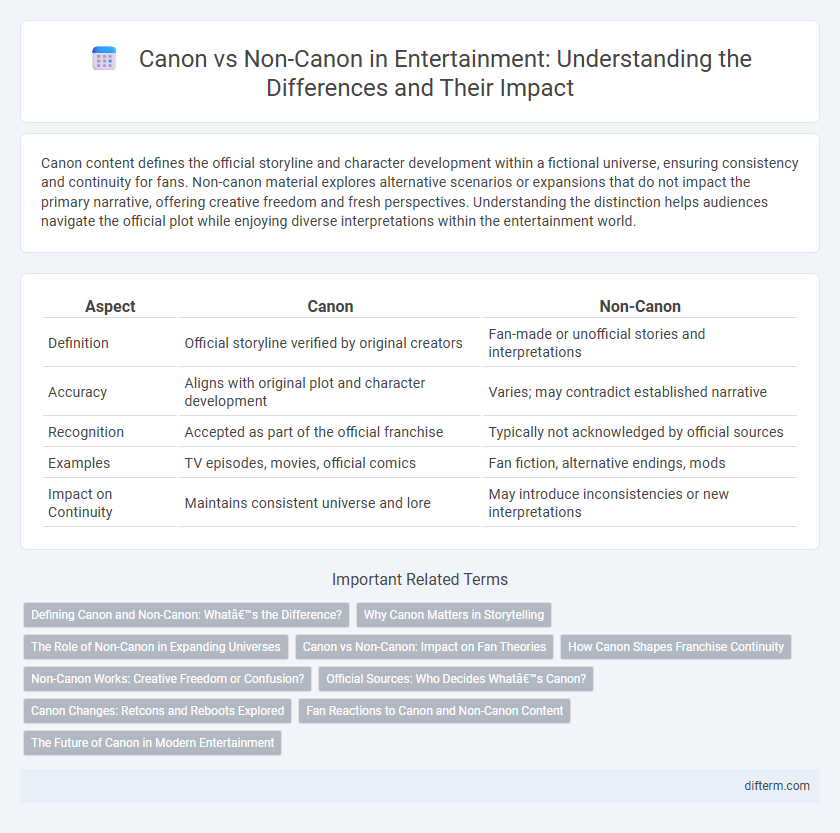Canon content defines the official storyline and character development within a fictional universe, ensuring consistency and continuity for fans. Non-canon material explores alternative scenarios or expansions that do not impact the primary narrative, offering creative freedom and fresh perspectives. Understanding the distinction helps audiences navigate the official plot while enjoying diverse interpretations within the entertainment world.
Table of Comparison
| Aspect | Canon | Non-Canon |
|---|---|---|
| Definition | Official storyline verified by original creators | Fan-made or unofficial stories and interpretations |
| Accuracy | Aligns with original plot and character development | Varies; may contradict established narrative |
| Recognition | Accepted as part of the official franchise | Typically not acknowledged by official sources |
| Examples | TV episodes, movies, official comics | Fan fiction, alternative endings, mods |
| Impact on Continuity | Maintains consistent universe and lore | May introduce inconsistencies or new interpretations |
Defining Canon and Non-Canon: What’s the Difference?
Canon in entertainment refers to the official storyline, characters, and events recognized by the original creators or rights holders as part of the authentic narrative universe. Non-canon denotes material like fan fiction, alternate storylines, or spin-offs that do not impact the official plot and are not formally acknowledged by the original creators. Understanding this distinction clarifies which works influence the continuity and which exist as independent or speculative content.
Why Canon Matters in Storytelling
Canon establishes an official framework that defines characters, events, and timelines, ensuring consistency and continuity within a story's universe. It creates a shared understanding among creators and fans, allowing deeper emotional investment and meaningful engagement. Non-canon works, while often creative and experimental, lack this authoritative validation, which can dilute the coherence and impact of the overarching narrative.
The Role of Non-Canon in Expanding Universes
Non-canon content plays a crucial role in expanding entertainment universes by allowing creators to experiment with alternative storylines, character developments, and settings without altering the original canon narrative. This freedom encourages fan engagement and creativity, often leading to new perspectives and deeper exploration of the fictional world. Non-canon works, such as spin-offs, fan fiction, and "what-if" scenarios, enrich the overall experience by adding layers of complexity and diversity beyond the main storyline.
Canon vs Non-Canon: Impact on Fan Theories
Canon establishes the official storyline and character developments recognized by the original creators, shaping the foundation for fan theories and discussions. Non-canon material, such as spin-offs or fan fiction, often introduces alternative plotlines and interpretations that expand the universe but lack authoritative validation. The distinction between canon and non-canon significantly influences fan engagement, with canon-based theories typically receiving more credibility and enduring interest within the fandom community.
How Canon Shapes Franchise Continuity
Canon in entertainment franchises defines the official storyline, ensuring consistency across movies, TV shows, books, and games, which preserves the integrity of the franchise universe. Non-canon content, while often creative and engaging, exists outside the established narrative, allowing fans to explore alternative scenarios without altering the main plotline. This clear distinction helps maintain franchise continuity, guiding creators and audiences in understanding which events and characters are part of the official storyline.
Non-Canon Works: Creative Freedom or Confusion?
Non-canon works in entertainment offer creators vast creative freedom, allowing them to explore alternative storylines, character developments, and world-building without the constraints of established lore. However, these deviations can create confusion among fans unsure of what content is officially recognized within a franchise's continuity. Balancing fan expectations and innovative storytelling remains a challenge when integrating non-canon material into popular media universes.
Official Sources: Who Decides What’s Canon?
Official sources such as original creators, production studios, and licensed publishers determine canon status in entertainment franchises. Canon is defined through authorized content like films, TV series, books, and games explicitly endorsed by rights holders. Fan works and unofficial adaptations, despite popularity, remain non-canon unless formally recognized by these official entities.
Canon Changes: Retcons and Reboots Explored
Canon changes in entertainment often involve retcons and reboots that reshape established storylines or character histories to fit new creative directions. Retcons, or retroactive continuity adjustments, alter past events or details to resolve inconsistencies or expand narratives, while reboots restart a franchise, discarding previous continuity altogether. These strategies impact fan engagement and franchise longevity by balancing nostalgia with innovation in storytelling.
Fan Reactions to Canon and Non-Canon Content
Fan reactions to canon content often show higher engagement and acceptance due to its official status within the original storyline, reflecting respect for established character arcs and plot consistency. Non-canon content sparks diverse responses, ranging from enthusiasm for creative freedom and alternative scenarios to criticism for deviating from the original narrative and disrupting lore integrity. This dynamic influences fan communities, shaping debates and fan theories around the validity and impact of both canon and non-canon materials in entertainment franchises.
The Future of Canon in Modern Entertainment
The future of canon in modern entertainment is increasingly shaped by expanding universes and fan-driven narratives, blurring traditional boundaries between official storylines and fan interpretations. Streaming platforms and transmedia storytelling encourage creators to explore multiple continuities, making canon a fluid concept rather than a fixed set of events. This evolving approach enhances audience engagement by allowing diverse, interconnected stories to coexist within popular franchises.
Canon vs Non-canon Infographic

 difterm.com
difterm.com